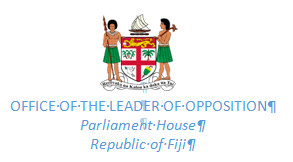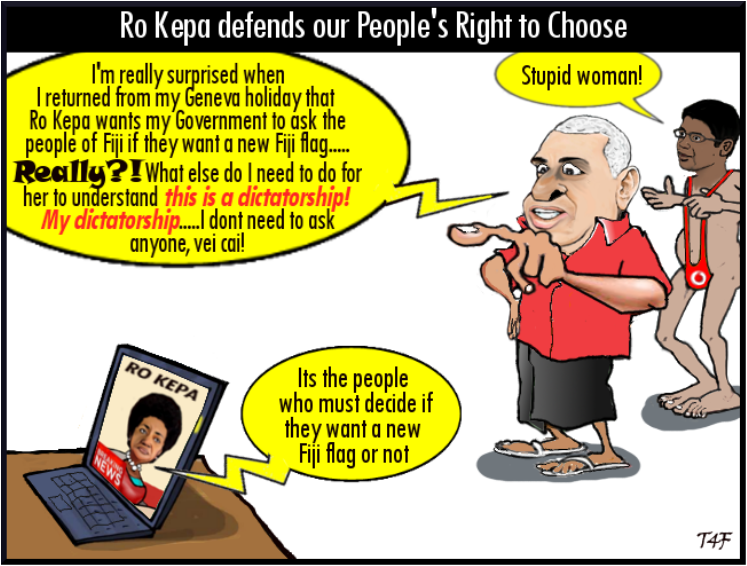Fijileaks: Did Great Britain or Mother Britannia rush to help free native Fijians and Others from the clutches of Bainimarama? NO!
We say, throw their bloody flag off from the Fiji flag! White Australians, Canadians and New Zealanders have ethnic sentiments to keep flying the British flag in their own respective flags!
BOYCOTTING ISSUES OF NATIONAL IMPORTANCE MAKES MANY UNFIT TO BE SITTING IN PARLIAMENT AND COLLECTING FAT PAY CHEQUES

Prime Minister Voreqe Bainimarama said he was surprised when he returned from Geneva on Friday to find that the Opposition is boycotting the national panel of citizens that is being set up to choose a new design for our flag from the ideas being put forward by ordinary Fijians.
Bainimarama said he does not understand why the Opposition wants Fiji to continue to honour the symbols of the colonial power that has gone from Fiji for 45 years.
He said Fiji is a young nation in every sense.
He said most of our population is young people who have no recollection of colonial times beyond what they read in the history books.
He added they deserve to honour symbols we can all relate to as Fijians - genuinely, authentically and proudly Fijian. Source: Fijivillage News

[40/3/2015]
Opposition Leader Ro Teimumu Kepa said today that Prime Minister Bainimarama’s ‘tantrum’ over her position on his flag committee was ‘childish’.
Ro Teimumu said that for the Prime Minister to express ‘surprise’ at our position on the flag given our protests in Parliament during his Ministerial Statement on the flag as well as the Petition that was tabled by Hon Gavoka calling for a referendum from the people on whether they want the flag changed or not, suggests he is either in a state of denial, or is simply uninterested in what anyone has to say about the flag.
A recent poll by Fiji live concluded that 60% of the people did not want to change the flag, at the recent Vegas Sevens protestors showed placards against a flag change, and in social media, young people are expressing disagreement to a change in the flag. And even in New Zealand, Prime Minister Key’s desire to change their flag got a resounding 84% NO vote from the New Zealand citizens.
Like the recent Shirley Park Parliamentary hearings that the AG tried to scuttle and interfere with, the Prime Minister’s Flag Committee is a duplicate of the Standing Committee on Justice, Law & Human Rights. His nominee for Chair of the Flag Committee Hon Iliesa Delana sits on this committee and Hon Ashneel Sudhakar is the Chair.
The Parliament Standing Committee has the same powers as a High Court and they must submit a report to Parliament to consider. The Prime Minister’s party has the majority seats in the House and can defeat the recommendations of the committee if he wishes.
Given that the Speaker on behalf of Parliament has assigned the Petition to a Standing Committee on Justice, and that Parliament is the highest law making body in the land, the Committee must proceed to do its job and travel around the country and let the people have their say.
Ro Teimumu Kepa said that although she and many of her Parliamentary colleagues wanted the Fiji flag retained, if the majority of the people submit to the Standing Committee for Justice, Law and Human Right that they want change, then so be it.
Ro Teimumu called for a truce between her and the Prime Minister Bainimarama and asked him to hang up his boxing gloves and join her and all members of Parliament to try working together on this issue and give Fiji’s fledgling democracy a chance by allowing the democratic processes established by the Parliament to do what it was designed to do and give power to and respect for our people and let them decide.
Authorized By
Ro Teimumu Kepa

"Only a national referendum can justify a change of flag, as the Leader of the National Federation Party has suggested."
By
Professor Wadan Narsey
A very good case can be made for Bainimarama’s proposal to change Fiji’s flag, as well as against it.
The public have expressed very strong views on both sides, with reason and emotion mixed in varying proportions.
In addition to examining Bainimarama’s justification, the public could also think more about the following:
* Why do only a few former British colonies include Union Jacks on their flags, and why do some of even this small number, also want to change today?
* Why did Fiji include the Union Jack not just after independence in 1874, but even after becoming a republic in 1987 and breaking away definitively from the British Crown?
* What difference will the national flag (unique or otherwise) make to our people’s everyday lives in terms of their “bread and butter” issues, in a rapidly globalizing world where national boundaries matter less and less?
* Are there far more important issues which our people should be debating and making truly democratic decisions on, such as the 2013 Constitution, the Electoral system, and the 2010 Media Decree?
Bainimarama’s view
Bainimarama wants to replace the British colonial symbols with “others that are indigenous and truly Fijian”.
His call that the flag should truly reflect the “current Fiji” naturally gives anti-Regime creative artists a field day, especially critical of the lack of genuine democracy in Fiji and the draconian media laws.
Bainimarama requests citizens to send in their ideas for a flag that would serve Fijians in the “decades and centuries ahead”, a bit of a hyperbole.
A National Panel of Citizens, selected by the Bainimarama Government upon consultation with the Opposition, would then “work with the Parliament” to make a selection on which “all Fijians could then have a say”.
Similar sentiments are being expressed in Australia and NZ where it is accepted that citizens will ultimately make the decision via referenda.
Bainimarama gives many arguments supporting his proposal.
He wants to break away from the colonial past and British symbols on our flag prevents that.
But as many critics have pointed out, the British have also bequeathed the English language (which the Bainimarama Government insists on being the language of our Parliament, even excluding the genuinely indigenous Fijian language), and also Christianity, which is also now the bed-rock of indigenous Fijian culture and tradition.
In more mundane matters, Bainimarama asserts that Fiji’s permanent secretaries do not have to be Fijians but may be expatriates (but not apparently Prime Ministers and ministers), as also may be our national sevens rugby coach .
Bainimarama claims that our citizens would be more committed and passionate about waving our national flag had it been unique with our own indigenous symbols on, and without the Union Jack.
This claim is patently without substance, when we observe the passionate flag waving that goes on at any international rugby sevens event, as even currently.
How sincere is Bainimarama’s claim that he would always value Fiji’s historical links to Britain and the British Crown, and what they left behind, including “the magnificent site of our new Parliament … our Westminster system of Parliament and our independent system of justice.”
The facts are that after the 2014 elections, Bainimarama rejected Fiji’s own indigenous Parliamentary complex in Draiba to return to the old “colonial parliament”.
The facts are that repeated military coups have trashed the Westminster system of Government.
The facts are that Bainimarama’s judicial system is a far cry from what the British left Fiji at independence.
Other flags with Union Jacks
Those interested might look at this interesting website (http://www.enchantedlearning.com/geography/flags/uklike.shtml) which shows that there are several other countries with Union Jacks as well, like Bermuda and Niue, and even states within independent countries like British Columbia and Manitoba (in Canada), and Hawaii (in United States).
But the salient point is that former white settler colonies (like Australia and NZ) which have Union Jacks in their flags were not oppressed by Britain.
They were allowed much greater independence (both economic and political) and allowed by Britain to peacefully evolve without any use of force by Britain to keep them under tight control, as they did with other non-white colonies.
A fascinating 2009 academic article by Olivier Accomonotti et al (“Black man’s burden, white man’s welfare: control, devolution and development in the British Empire, 1880–1914” asks why white settler colonies fared much better than colonies with largely non-white people.
It establishes using solid economic analysis that the underlying fundamental difference was the prevailing racism in Britain (and Europe in general) that allowed violence to be used to subjugate non-white colonies and discourage their institutional development.
This violence could not be used against colonial white settlers (such as in Australia and NZ) who were “kith and kin” of the British, and who would have declared total independence from the British Crown, as did colonial United States in 1774.
[It would be a mistake to view British colonialism as a purely white and black affair which it may have largely been during the nineteenth and twentieth centuries. Some historians know that the earliest colonialism and just as vicious was by white English colonialists against white Irish, Scottish and Welsh people, many of whose older generations have little love for the English to this day.]
But white settler colonies like Australia and NZ valued their links to their British “kith and kin” and understandably at independence, included the Union Jack in their flags.
Those colonies (including countries as diverse as United States, Kenya and India) which struggled for independence from Britain, and most of whom suffered economically, rejected the Union Jack as a symbol of their colonial oppression.
But Australia and NZ have now become far more multiracial through the immigration of non-whites (both Asians and Pacific Islanders), and their indigenous populations are being given proper national recognition, instead of being threatened by genocide, as was the practice in the old colonial days.
It is no surprise that their younger generations with few linkages to Old England, and forward looking politicians, want new national flags.
Interestingly, the Union Jack in Britain may change if Scotland (represented by the white diagonal cross of St Andrew on a blue background) were to leave the British union. Some conjecture this might give space to acknowledge Wales, whose flag has a red dragon on a white and green background
Fiji’s mixed links to Britain
Most historians of colonial Fiji conclude that Fiji suffered economically because its resources were used for imperial objectives (which included that of Australian giant Colonial Sugar Refining Company) and “benign neglect” by the imperial power (to put it mildly).
Indigenous Fijians did not suffer much in the colonial period, with Indian indentured laborers bearing the largest burdens of colonialism.
Most indigenous Fijians believe in their “special relationship” to Britain, believing that their chiefs voluntarily ceded Fiji in 1974 to the British Crown who promised them protection in return.
They point to one tangible benefit: the protection of their communally owned land, declared inalienable under law during the colonial days, after some choice parcels had been made freehold.
Quite supportive of the inclusion of the Union were the politically powerful and elite Fijian chiefs for whom having a “lineage” with the British Crown (the foremost “chief of Fiji”) helped to legitimize their own authority over the indigenous Fijian people.
One aspect of this “royal aura” was continued in the independent era with the use of the knighthood to recognize “exemplary citizens”, bestowed on the elite chiefs and many Europeans, but miraculously and largely excluding those of Indo-Fijian and Chinese origins, or commoner Fijians.
Did Britain reciprocate?
The jury is still out on whether Britain ever truly reciprocated these sentiments for all the Fijian people.
Most indigenous Fijians also faced discrimination in the colonial era, even the most influential high chief in Fiji’s history, Ratu Sir Lala Sukuna, was not allowed to join the British army during World War I as a qualified officer so he proved his patriotism by joining the French army, and was duly recognized with their highest honor for bravery.
For most of the colonial period, the ordinary commoner Fijians were also denied basic services such as education and infrastructure, while no effort was made to enhance their economic development, except in so far as they could raise taxes for the colonial administration.
Nevertheless, indigenous Fijians pretty well followed the leadership provided by their chiefs when it came to their total respect for the British Crown and their willingness to sacrifice their lives in the imperial cause, whether in World War II or the Malayan war against the Communist movement for their independence.
The British High Commissioner to Fiji has diplomatically stated that the flag issue was one for the Fiji people and government to decide and Britain cherished its links with Fiji.
But the British Crown also has a checkered history with respect to its own commitment to Fiji’s Westminster system of government and constitutional law that she supposedly bequeathed Fiji, which might have vaguely justified the Union Jack’s presence on our flag.
The British Crown refused to meet with Fiji’s lawfully elected Prime Minister, Dr Bavadra, after he was deposed by the 1987 coup, yet readily met with indigenous Fijian leaders who formed the new republican government (including Ratu Sir Kamisese Mara and Sitiveni Rabuka and the Queen’s former Fiji Governor who became the new President, Ratu Sir Penaia Ganilau).
Many Indo-Fijian intellectuals then believed that the treatment of Dr Bavadra was all to do with the British Crown having a special relationship only with Fiji’s indigenous Fijians, who through the 1987 coup, were supposedly regaining political control from the Indo-Fijian based Fiji Labor Party.
But that pet theory should now be put to rest with the British Government readily recognizing the Bainimarama military government after the 2006 coup which removed the lawfully elected indigenous Fijian government of Prime Minister Laisenia Qarase, the leader of the Fijian SDL Party.
It might seem after all, that the British Crown’s real valued link with Fiji has been, and still is, with the Fiji military, who were used by Britain to quell the 1950s Communist-led independence movement in Malaya, as well as to facilitate the nuclear testing in Christmas Island (while denying them compensation). It is also relevant that there continues to be a significant number of Fijians serving in the British Army despite its recent downsizing.
The bottom line is that with the colonial whites and pro-British high chiefs being most influential at Fiji’s independence, it should be no surprise that the Union Jack was included in the Fiji flag, rejecting other indigenous designs such as old pre-Cession flag of the Cakobau Government.
Most Indo-Fijians have no such attachment to the Union Jack, remembering the oppression of their forefathers in the indenture period and the reluctance of Britain to give them equal status to Fiji’s Europeans, during the colonial period.
Some Indo-Fijians with strong times to India, recall the oppression of the Indian people and the struggles for Indian independence by revered leaders such as Mahatma Gandhi, Jawaharlal Nehru and Subhas Chandra Bose.
It is no surprise that most Indo-Fijians support Bainimarama’s plan to remove the Union Jack from Fiji’s flag.
This support is even coming from those Indo-Fijians who have already emigrated to other lands, clearly indicating that they believe that the protection of other flags are more beneficial for their families and themselves, than the Fiji they proclaim their love for.
A Fiji flag in a future world order
While Bainimarama wants the Fiji flag that will be relevant for “decades and centuries”, I suspect that the speed with which the world is globalizing will make the national flag rather irrelevant within a few decades.
A national flag essentially declares “we are a unique country, different from all others, in serving the basic needs of our citizens”.
The jingoistic flag-waving by Britain, France, Germany, Japan, USA etc. during World War I and World War II, which past generations thought was necessary to protect their livelihoods, is hopefully a thing of the past.
The rallying cry of many political leaders, accompanied by much flag waving, was “sacrifice your lives for God, country and your flag”.
But some historians know that at the heart of the world wars have been economic and financial interests that selfishly used nationalistic flag-waving to obtain territorial gains for their investments through extension of empires, even if it meant sacrificing millions of lives, on both sides.
Today, national boundaries are slowly but surely dissolving and former bitter enemies have integrated into regional blocs like the European Union or ASEAN or NAFTA.
This is a tendency extending throughout the world, encouraged by Free Trade Area agreements and the binding rules of World Trade Organization.
Despite the occasional hiccup and territorial disintegration, there will eventually be some kind of a global economy where nation states and their flags will matter less and less in the daily lives of our people.
For Fiji similarly, the future lies in closer economic and political relations with Australia and NZ (if PACER ever become a reality) or some other international economic grouping that satisfies our “bread and butter” needs.
Nationalism and flag waving will remain largely confined to sports events, which all know to be a crude peace time substitute for battles and wars, with “crossing the opponent’s line or goal” associated with victory, just as in military battles and wars.
The challenge for all people in Fiji (and elsewhere in the world) is to recognize that the people who are “good positive influences” for their lives and families’ livelihoods, are not defined by citizenship and the flags they wave around: they can be locals or foreigners, black or white, Christian or Hindus or Muslims. Likewise, the “bad” influences can also be locals or foreigners. Flags of allegiance just do not matter.
Nevertheless, everywhere in the world, some callous politician will come along trying to exploit popular “nationalistic” sentiment for their own selfish ends, giving substance to Samuel Johnson’s well known dictum “patriotism is the last refuge of scoundrels” (however inconsistent Samuel Johnson himself was with his own popular saying).
Are there more pressing issues?
The public should ask themselves why they are so willing to engage in heated debate about a mere symbolic “national flag” when they have been totally quiet about far more fundamental and important changes in their national lives, such as the unilateral imposition of the 2013 Constitution and the electoral system, the FNPF decrees and the 2010 Media Industry Decree, not to forget the force change of name of “Fijians” to “iTaukei” and all others to “Fijian” (with some strange side effects).
But, rather than being cynical about the whole exercise as many seem to be, the public should play along.
This Bainimarama initiative is a small opportunity to strengthen democracy in a corner of national decision-making, whatever the outcome, for or against the flag change.
How to decide?
It is unfortunately not reassuring that the Commander of the RFMF has publicly weighed in with his support of Bainimarama’s proposal, and even encouraged a competition among his soldiers for the design of the flag. With his previous declaration that the RFMF would back the 2013 Constitution and Bainimarama, is the public to expect some military symbol on the future national flag?
The public should not and cannot accept a parliamentary vote as a decision-making mechanism, as the elections for parliament were fought and won for all kinds of other bread and butter issues, nothing to do with the national flag, and the fact that Fiji First parliamentarians almost certainly will feel obliged to vote in a block to support their Great Leaders.
Given the deep national polarization and in keeping with international practice on such matters, only a national referendum can justify a change of flag, as the Leader of the National Federation Party has suggested.
Rejection of a referendum by the Bainimarama Government and imposition of their choice of a new flag through some “managed” National Panel of Citizens (like the aborted People’s Assembly originally envisaged for the Yash Ghai Draft Constitution) would only prove to cynics that the 2014 elections have not brought back real democracy to Fiji at all, and that the Bainimarama Government is simply continuing their dictatorship of the previous seven years under the guise of parliamentary democracy.
Bainimarama and his cabal of advisers might have just woken up a large sleeping dog.
https://narseyonfiji.wordpress.com/2015/02/15/furor-over-national-flag-how-to-decide-significantly-edited-version-in-the-fiji-times-14-feb-2015/


